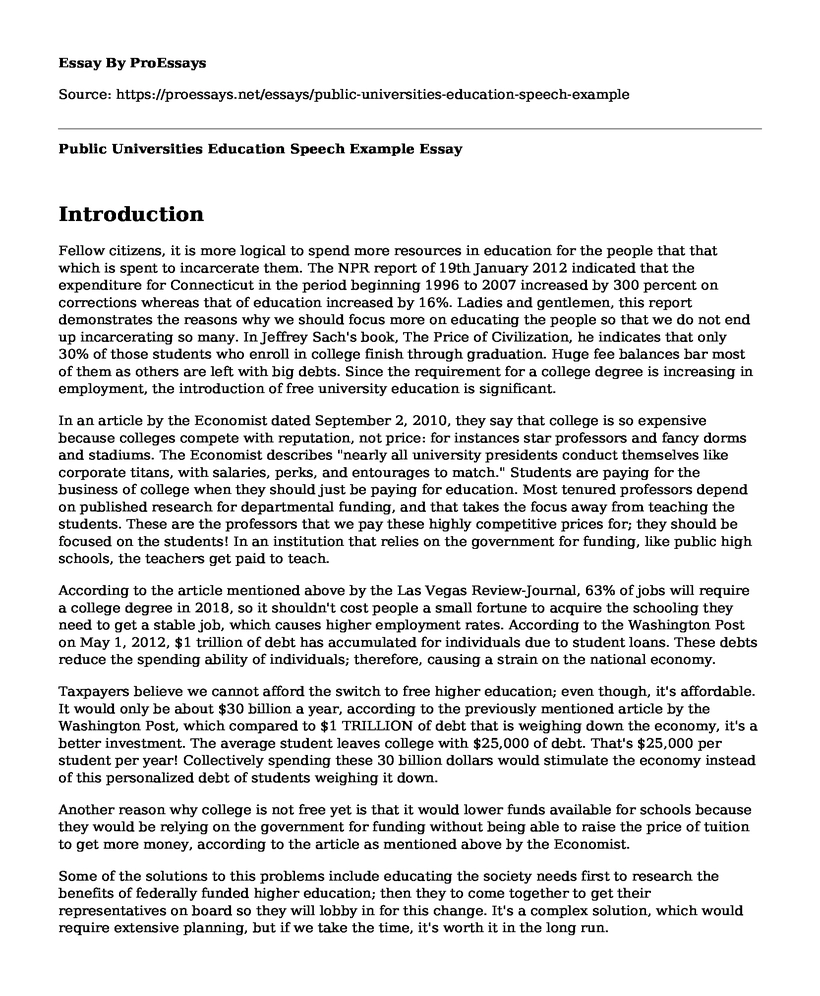Introduction
Fellow citizens, it is more logical to spend more resources in education for the people that that which is spent to incarcerate them. The NPR report of 19th January 2012 indicated that the expenditure for Connecticut in the period beginning 1996 to 2007 increased by 300 percent on corrections whereas that of education increased by 16%. Ladies and gentlemen, this report demonstrates the reasons why we should focus more on educating the people so that we do not end up incarcerating so many. In Jeffrey Sach's book, The Price of Civilization, he indicates that only 30% of those students who enroll in college finish through graduation. Huge fee balances bar most of them as others are left with big debts. Since the requirement for a college degree is increasing in employment, the introduction of free university education is significant.
In an article by the Economist dated September 2, 2010, they say that college is so expensive because colleges compete with reputation, not price: for instances star professors and fancy dorms and stadiums. The Economist describes "nearly all university presidents conduct themselves like corporate titans, with salaries, perks, and entourages to match." Students are paying for the business of college when they should just be paying for education. Most tenured professors depend on published research for departmental funding, and that takes the focus away from teaching the students. These are the professors that we pay these highly competitive prices for; they should be focused on the students! In an institution that relies on the government for funding, like public high schools, the teachers get paid to teach.
According to the article mentioned above by the Las Vegas Review-Journal, 63% of jobs will require a college degree in 2018, so it shouldn't cost people a small fortune to acquire the schooling they need to get a stable job, which causes higher employment rates. According to the Washington Post on May 1, 2012, $1 trillion of debt has accumulated for individuals due to student loans. These debts reduce the spending ability of individuals; therefore, causing a strain on the national economy.
Taxpayers believe we cannot afford the switch to free higher education; even though, it's affordable. It would only be about $30 billion a year, according to the previously mentioned article by the Washington Post, which compared to $1 TRILLION of debt that is weighing down the economy, it's a better investment. The average student leaves college with $25,000 of debt. That's $25,000 per student per year! Collectively spending these 30 billion dollars would stimulate the economy instead of this personalized debt of students weighing it down.
Another reason why college is not free yet is that it would lower funds available for schools because they would be relying on the government for funding without being able to raise the price of tuition to get more money, according to the article as mentioned above by the Economist.
Some of the solutions to this problems include educating the society needs first to research the benefits of federally funded higher education; then they to come together to get their representatives on board so they will lobby in for this change. It's a complex solution, which would require extensive planning, but if we take the time, it's worth it in the long run.
Conclusion
In conclusion, if we focused our money on educating our citizens, instead of incarcerating them; we could see an improvement across America. Employment rates would be higher, national debt for individuals would be lower allowing people to purchase their own houses easier, and they wouldn't have to rely on government assistance as much. Also, we can get the researchers in the lab and teachers in the classroom. No child left behind is the rule until the child completes high school. But college is the new necessity for a career and independent citizens; therefore, it could be seen that we are leaving children behind because they cannot afford to be educated. Society needs to come together and say that we don't want to be left behind anymore.
Works Cited
Amdur, Eli. "By 2018, 60 percent of job openings will require a college education." The Las Vegas Review-Journal. Stephens Media LLC, 14 July 2013. Web. 18 March 2019. http://www.reviewjournal.com/news/education/2018-60-percent-job-openings-will-require-college-education.
Heuvel, Katrina Vanden."Free College? We can afford it." The Washington Post. The Washington Post, 1 May 2012. Web. 18 March 2019. http://www.washingtonpost.com/opinions/free-college-we-can-afford-it/2012/05/01/gIQAeFeltT_story.html.
Sach, Jeffrey. The Price of Civilization: Reawakening American Virtue and Prosperity. New York: Random House, 2012. Print
Samuels, Bob. "Why All Public Higher Education Should Be Free." Huffington Post College. TheHuffingtonPost.com, Inc., 18 November 2011. Web. 18 March 2019. www.huffingtonpost.com/bob-samuels/why-all-public-higher-edu_b_1099437.html.
Schumpeter. "Declining by degree." The Economist. The Economist Newspaper Limited 2014, 2 September 2010. Web. 18 March 2019. http://www.economist.com/node/16941775.
Cite this page
Public Universities Education Speech Example. (2022, Dec 14). Retrieved from https://proessays.net/essays/public-universities-education-speech-example
If you are the original author of this essay and no longer wish to have it published on the ProEssays website, please click below to request its removal:
- Intercultural Learning, Global Health, and Nursing: Teaching and Learning Strategies
- Impacts of Social Media on College and the Car Industry Paper Example
- Essay Sample on Teachers Struggle With Indiscipline Cases
- The Impact of Language on Cognition: Linguistic Relativity - Essay Sample
- Essay Example on China's College Entrance Exam: Merits & Reforms
- Essay Example on ACE Score & Its Impact on Future Mental & Physical Health
- Essay Sample on Knowledge and Experiential Gain in CPM







